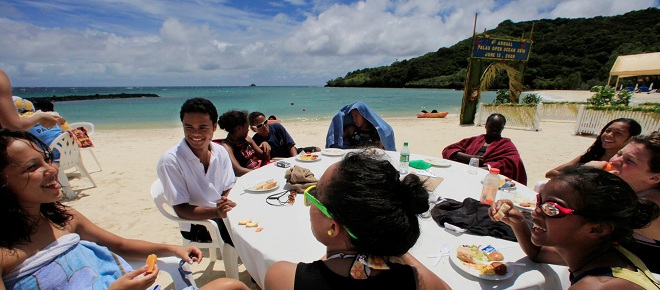Who knew the South Pacific could be so loud?
Tease the day: No one can claim island nations will give up quietly
In this Saturday, June 13, 2009 photo, Palauan citizens eat lunch at Palau Pacific Resort in Ngerkebesang, Palau. Only a few of the Guantanamo detainees Palau has agreed to resettle have shown interest in moving to this remote Pacific nation, its government said Tuesday, June 23, 2009. The 13 Turkic Muslims from far western China are concerned about the island nation’s ability to provide for their safety, according to a government statement. (AP Photo/Itsuo Inouye)
Share

It’s now clear, if it wasn’t before, that South Pacific nations will not lose quietly on the international stage. Last week, four island nations sided with Israel as the United Nations voted to grant Palestinians enhanced status. Only eight countries joined Israel in that fight. A few days ago, Marlene Moses—representing Nauru, one of the countries that sided with Israel, and speaking on behalf of a larger group of island nations—called on advanced nations to renew their Kyoto Accord commitments for another five years. This morning, we learn that New Zealand is pulling out of the next phase of Kyoto. The Kiwis made the announcement during ongoing climate talks in Doha, and it “stunned” that bloc of much smaller island nations that, as you might expect, worry about what rising seas might mean for their ability to live on land.
Some of those same islands made headlines in today’s Ottawa Citizen, thanks to their vocal opposition to apparent overfishing of bigeye tuna in the Pacific. An official from Palau, another Israel-aligned country that’s representing a bloc of islands at a fisheries conference in the Philippines, made serious demands of larger nations that fish in Pacific waters. Whether or not any of these diplomatic efforts are successful, and that’s far from a sure thing in each case, no one can claim that Pacific nations are twiddling their thumbs in the corner. Perhaps it’s worth knowing all of that about a group of nations that are among Canada’s only friends when it comes to Israeli-Palestinian diplomacy.
What’s above the fold this morning?
The Globe and Mail leads with Canada’s continued desire for a new approach to Israeli-Palestinian diplomacy. The National Post fronts Israel’s refusal to transfer $100 million to the Palestinian Authority. The Toronto Star goes above the fold with nine unnamed private clinics that provided substandard care to patients. The Ottawa Citizen leads with Ontario’s secondary school teachers rejecting a tentative deal thanks to actions taken by provincial education minister Laurel Broten. iPolitics fronts Correctional Service Canada plans to make double bunking in cells a regular occurrence. National Newswatch showcases a Tim Harper column in the Toronto Star about Conservative hypocrisy when it comes to accountability and transparency.
Stories that will be (mostly) missed
| 1. Kyoto Accord. At international climate talks, New Zealand’s climate minister announced the country—which met its first Kyoto targets—will pull out of the accord’s second phase. | 2. Canadian avoids execution. Saeed Malekpour, a Canadian resident who was accused by Iranians of creating pornographic websites, had a death sentence in Iran suspended. |
| 3. Bat death. A fungus that proliferates in North American caves and kills bat populations could cost farmers on the continent billions of dollars thanks to higher insect populations. | 4. Unhappy students. McGill University’s mental health services officials are reporting a dramatic upswing in both emergency drop-ins and overall visits compared to previous years. |
What should I cover?
It’s time for a little experiment. I’m going to tell you about a few things happening today on Parliament Hill, and then you tell me what I should go watch—and, following that, report on. There’s plenty of action on the Hill today. Eight parliamentary committees, including two Senate committees, are talking about various studies and pieces of legislation. The list of meetings I can attend, if we’re being realistic, is below, along with the orders of the day for each. The list is below. So tell me: Where should I go?
House of Commons
| Aboriginal Affairs and Northern Development | Bill C-47, Northern Jobs and Growth Act Supplementary Estimates (B), 2012-13 |
| Citizenship and Immigration | Standing on Guard for Thee: Ensuring that Canada’s Immigration System is Secure |
| Environment and Sustainable Development | Urban Conservation Practices in Canada |
| Finance | Pre-budget Consultations 2012 Supplementary Estimates (B) 2012-2013 |
| Public Safety and National Security | Bill S-7, Combating Terrorism Act |
Senate
| National Security and Defence | Canada’s national security and defence policies, circumstances and capabilities |
| Official Languages | Study on CBC/Radio-Canada under the Official Languages Act and the Broadcasting Act |
If you think those committees are boring and know about something, you know, more interesting, pop it in a comment. You could also send it in an email or—gasp!—a Twitter DM to @TaylorVaisey, but why keep secrets from everyone?